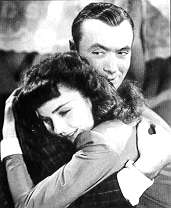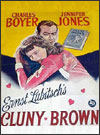FILM NOTES
FILM NOTES INDEX
NYS WRITERS INSTITUTE
HOME PAGE

(United States, 1946, 100 minutes, b&w, 35mm)
Directed by Ernst Lubitsch
Cast:
Jennifer Jones . . . . . . . . . . Cluny Brown
Charles Boyer . . . . . . . . . . Adam Belinsky
Peter Lawford . . . . . . . . . .Andrew Carmel
Reginald Gardner . . . . . . . . . .Hilary Ames
The
following film notes were prepared for the New York State Writers
Institute by Kevin Jack Hagopian, Senior Lecturer in Media Studies
at Pennsylvania State University:
Ernst Lubitsch was famed as a director of exquisitely sophisticated entertainments, but if you've never seen one of his films before, you'll be surprised at his roundabout way of getting "sophisticated" in Cluny Brown. One of the film's first shots is of a clogged pantry sink in an upper class home; we're looking at a dark, cold soup of black water, melon rinds and vegetable peelings. Around the offending sink are soon clustered the frantic host, Hilary Ames (Reginald Gardner), a pretty lady plumber, Cluny Brown (Jennifer Jones), and a philosophical refugee professor, Adam Belinsky (Charles Boyer). Professor Belinsky mordantly observes that a stopped-up sink "is an analogue for human frustration." Well, no it isn't, at least, not in this movie, because in the world of Ernst Lubitsch, human frustration is the predicate to romance and lust and laughter, and perfectly tailored evening clothes -- that is, all the really fine things in life. And yet there is something regretful in this still almost undiscovered Lubitsch comedy.
Lubitsch's great films of the 1930's (Design for Living, Trouble in Paradise, One Hour with You) were castles in air, founded on the sheerest excuses for plot, their brazen transparency part of the legendary "Lubitsch touch," a touch so light it was weightless. But Cluny Brown is the product of a wartime sensibility, and war managed to sadden even the redoubtable Lubitsch. His beloved Berlin was in ruins, and with it, the prewar world of elegant farce and decadent sexuality he had imported to Hollywood with his arrival in the 1920's. His Cluny Brown is an orphan, rootless, without home or family, other than a gruff uncle, and she works as a maid. For Cluny, plumbing is the most sublime of pleasures. She is searching for a place to whang away at the pipes with a big wrench, for she knows that, when she has found such a place, she will be at home. For now, though, the search is fruitless. "I'm an orphan, and I've never heard my mother snore," she says, with deep melancholy, and that is the voice of Ernst Lubitsch, in a small epitaph for the death of laughter all across Europe in that winter of 1946.
 The visual tone of films like Trouble in Paradise had been white - a dazzling, iridescent Art Deco white, with characters full of the gleaming narcissism of the very idle rich. But the war changed Lubitsch, and his weariness shows in Cluny Brown. (Lubitsch would die, suddenly, less than a year after the release of Cluny Brown, in the midst of making That Lady in Ermine. The the film would be completed by a grieving Otto Preminger.) Here, in Cluny Brown, the tone is the brown of the title, albeit the comfortable brown of the autumnal English countryside, of the men's felt fedoras, and of the dark wood and pipe smoke of the English country house. Simply put, Lubitsch was hurting too much in 1946 to offer up the frivolities of his earlier films with the same joyous abandon.
The visual tone of films like Trouble in Paradise had been white - a dazzling, iridescent Art Deco white, with characters full of the gleaming narcissism of the very idle rich. But the war changed Lubitsch, and his weariness shows in Cluny Brown. (Lubitsch would die, suddenly, less than a year after the release of Cluny Brown, in the midst of making That Lady in Ermine. The the film would be completed by a grieving Otto Preminger.) Here, in Cluny Brown, the tone is the brown of the title, albeit the comfortable brown of the autumnal English countryside, of the men's felt fedoras, and of the dark wood and pipe smoke of the English country house. Simply put, Lubitsch was hurting too much in 1946 to offer up the frivolities of his earlier films with the same joyous abandon.
But not to worry, for there is much Lubitsch silver here. The film can still nod at the whimsies of the rich with the kindest of glances, treating the momentary silly rows between youthful paramours with all the gravity the young lovers require. But now, there is a feeling of hollowness at the old affection for the empty-headed rich. Lubitsch's heroine is emphatically a girl of the working class, and the desire she arouses in Andrew Carmel (Peter Lawford), the scion of a pleasantly sluggish family of the gentry, is a sly challenge to the old immutable barriers of class in England.
The sensuous, flighty Cluny will face a romantic quandary, but it's not at all the same as that of previous Lubitsch heroines, who often got to choose between two men: a handsome, witty guy, and a handsome, witty, rich guy. Cluny's decision, however, is between a hugely drab life as the wife of a shopkeeper, or a well-upholstered but preposterous existence as the future lady of the Carmel manor. It looks like a photo finish between two duds, but just then, Lubitsch's sympathies are tipped by young Andrew's belated growing up in wartime. That maturity is expressed in a backhanded way, in an exchange you'll only find in a Lubitsch film. Aroused by the war, Andrew tells professor Belinsky, "I intend to write another letter to the Times." "Good," shrugs the professor, hoping for more than that as a sign of Andrew's antifascism. "No... No, I'll join the R.A.F," says Andrew, uncertainly. "Better..." says Belinsky. "Join the R.A.F, and rise above the Times."
Who's for Cluny Brown? The callow Andrew, or the mildewed shopkeeper? But wait -- who's that coming up on the outside?!! For this is Lubitsch, where even war cannot stifle passion. Cluny is to have her home, after all, and with it, the exquisite and complicated plumbing she loves.
— Kevin Hagopian, Penn State University
For additional information, contact the Writers Institute at 518-442-5620 or online at https://www.albany.edu/writers-inst.
 Cluny Brown
Cluny Brown